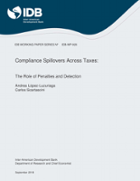Compliance Spillovers across Taxes: The Role of Penalties and Detection
Date
Nov 2018
Journal version
Summary
What happens when the tax authority increases enforcement in one tax with compliance in other taxes? The very little evidence available is not conclusive. This paper presents a very simple analytical model that shows the conditions under which spillovers could be positive or negative in the context of uncorrelated taxes for the same individual (a property tax and a self-declaration tax—in this instance, a gross-sale tax). In the model, the sign of the spillover depends on how taxpayers update their beliefs on penalty and detection probabilities for one tax after watching the deterrence actions the tax agency took on another tax. Results from a randomized field experiment show no evidence of negative spillovers: increasing the salience of fines and enforcement probabilities for those who do not comply with the payment of the property tax does not decrease how much the same individual declares on the gross-sale tax. The result has ample implications for researchers bringing interventions to the field and for governments’ enforcement strategies. Given that most taxpayers are liable for more than one tax, neither researchers nor authorities can continue to neglect potential spillovers of interventions. Instead, they should design enforcement strategies that maximize compliance across the portfolio of taxes. Importantly, this work indicates that penalties and detection may not be perfect substitutes when the portfolio is taken into consideration.




